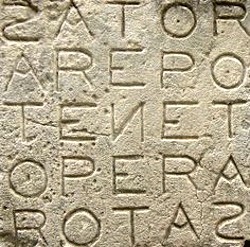
...the only literary pursuit which engaged Harriet at present, the only mental provision she was making for the evening of life, was the collecting and transcribing all the riddles of every sort that she could meet with, into a thin quarto of hot-pressed paper, made up by her friend, and ornamented with ciphers and trophies.
In this age of literature, such collections on a very grand scale are not uncommon.
In our house we love word games. When we are camping (or sometimes even just around the dinner table), we make up word games where a sentence must be made by everyone saying one word starting with the same letter of the alphabet. One that we came up with was:
Benny's beautiful bride Bertha bit Boris's balloon.

Similar to this is one that my mum produced last time the kids and I were visiting her. Called, Absurd Words, this game comes with little cards each with a different letter of the alphabet. Everyone playing picks one (or two if there are only a few playing) card and then they are laid out in order below. A sentence must be made with each word starting with these letters of the alphabet. The game suggests that the more absurd the sentence, the better!

Bananagrams is another fun word game that is perfect for quiet afternoons, or slow winter mornings. This works a bit like Scrabble (which is such another fun word game on its own!), except that you are building on your own words with the letter tiles. All of my children like the challenge of this because they can move at their own pace, spelling words that are suitable to their ability.
Just like Major Burnaby and Captain Trevelyan in Agatha Christie's The Sittaford Mystery, I also enjoy doing Crossword puzzles and word searches.
' "You go in for competitions, don't you?" asked Violet. "Acrostics and crosswords and all those things."
Burnaby nodded.
"I do crosswords. Trevelyan does acrostics. We each stick to our own line of country. I won three books last month in a crossword competition," he volunteered." '
I can always guarantee that one of these little books will appear in a Mother's Day or birthday present from my children or husband. They don't usually last longer than a year. Recently, my son has enjoyed doing them with me. If you prefer, there are plenty of apps which you can use to keep the "little grey cells" sharp (as our friend Hercule Poirot would say). The joy of word games, riddles, and puzzles, is that they really are for everyone. You can do them on your own, or with your family. Children who are hesitant to read or write might enjoy the competitive game aspect. Those who do love to read or write, will enjoy these sorts of games even more. They are great for some mindful downtime, but also for boisterous social fun. If you're interested in finding out more about crosswords and "the puzzling people who can't live without them," you might like to check out Adrienne Raphel's book, Thinking Inside The Box: Adventures with Crosswords and the Puzzling People Who Can't Live Without Them.
But the really good news is that word puzzles may be good for our brain health. Dementia Australia says that word games help us to look after our mind. With so many free and cheap ways to keep our mind sharp, why not consider taking up word puzzles when you are feeling bored or restless? And to get you started, here is a little riddle from 1883 that took me a while to solve. If you get it, please share in the comments below!
ENIGMA
I'm found in the ocean but not in the sea,
On mountain and moor but never on lea;
To pastime and pleasure a stranger am I,
But in labour and sorrow my form you decry.
With the rover I travel wherever he goes,
Through Afric's hot regions or cold Alpine snows;
I dwell with people all over the world,
But often by them to perdition I'm hurled.
Four brothers I have, and half-brothers two,
To say what I am I leave, reader, to you.



Comments
Post a Comment